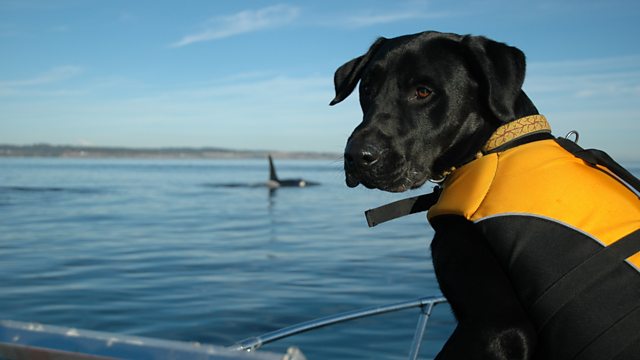16/12/2010
One Planet takes a boat trip with Tucker the sniffer dog and his team of zoologists in search of killer whale faeces. Their mission: to find out why the killer whales are dying.
Andrew Luck-Baker spends a day on a motor boat with Tucker the sniffer dog and his team of zoologists in search of killer whale faeces, floating in the waters off the North American Pacific coast.
Tucker is a black Labrador. He is one of an elite team of detection dogs, trained to find the faeces of threatened animals in the cause of conservation.
A lump of faeces is packed with information about an animal鈥檚 stress levels, fertility, nutritional health and exposure to chemical pollution. There is no other way to reap this information from whales because whales spend most of their lives underwater. It is impossible to take blood samples from them. A trained dog鈥檚 nose enables researchers to find whale scat in much greater quantities than by relying on their own human senses.
Tucker鈥檚 work, currently funded by the Washington Sea Grant, means the scientists from the University of Washington in Seattle can start to piece together an explanation for why a special population of killer whales in North America is in decline and at risk from extinction.
This community of orca lives in the Salish Sea between Vancouver Island and the mainland US Pacific coast. They number about 90 individuals and in recent years they have suffered some terrible times. Two years ago, about one in ten died. Several years earlier, 20% of them were lost.
[Photo credit: Kelley Balcomb-Bartok]
Last on
More episodes
Previous
Broadcasts
- Thu 16 Dec 2010 10:32GMT大象传媒 World Service Online
- Thu 16 Dec 2010 15:32GMT大象传媒 World Service Online
- Thu 16 Dec 2010 20:32GMT大象传媒 World Service Online
- Fri 17 Dec 2010 01:32GMT大象传媒 World Service Online
- Sat 18 Dec 2010 20:30GMT大象传媒 World Service Online
- Sun 19 Dec 2010 02:30GMT大象传媒 World Service Online
- Sun 19 Dec 2010 06:32GMT大象传媒 World Service Online
- Sun 19 Dec 2010 23:30GMT大象传媒 World Service Online
大象传媒 World Service Archive
This programme was restored as part of the World Service archive project

